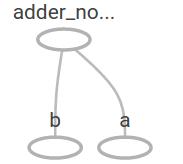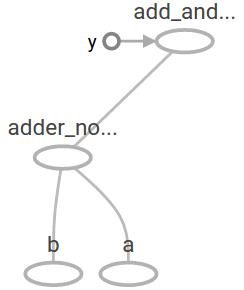Tensorflow基本操作理解
Posted chaofn
tags:
篇首语:本文由小常识网(cha138.com)小编为大家整理,主要介绍了Tensorflow基本操作理解相关的知识,希望对你有一定的参考价值。
1. TensorsTensorFlow的数据中央控制单元是tensor(张量),一个tensor由一系列的原始值组成,这些值被形成一个任意维数的数组。一个tensor的列就是它的维度。
2. The Computational Graph TensorFlow核心程序由2个独立部分组成:
a:Building the computational graph构建计算图
b:Running the computational graph运行计算图
一个computational graph(计算图)是一系列的TensorFlow操作排列成一个节点图。
node1 = tf.constant(3.0, dtype=tf.float32) node2 = tf.constant(4.0)# also tf.float32 implicitly print(node1, node2)
最后打印结果是:
Tensor("Const:0", shape=(), dtype=float32) Tensor("Const_1:0",shape=(), dtype=float32)
要想打印最终结果,我们必须用到session:一个session封装了TensorFlow运行时的控制和状态
sess = tf.Session() print(sess.run([node1, node2]))
我们可以组合Tensor节点操作(操作仍然是一个节点)来构造更加复杂的计算,
node3 = tf.add(node1, node2) print("node3:", node3) print("sess.run(node3):", sess.run(node3))
打印结果是:
node3:Tensor("Add:0", shape=(), dtype=float32) sess.run(node3):7.0
3. TensorFlow提供一个统一的调用称之为TensorBoard,它能展示一个计算图的图片;如下面这个截图就展示了这个计算图

4 一个计算图可以参数化的接收外部的输入,作为一个placeholders(占位符),一个占位符是允许后面提供一个值的。
a = tf.placeholder(tf.float32) b = tf.placeholder(tf.float32) adder_node = a + b # + provides a shortcut for tf.add(a, b)
这里有点像一个function (函数)或者lambda表达式,我们定义了2个输入参数a和b,然后提供一个在它们之上的操作。我们可以使用feed_dict(传递字典)参数传递具体的值到run方法的占位符来进行多个输入,从而来计算这个图。
print(sess.run(adder_node, {a:3, b:4.5})) print(sess.run(adder_node, {a: [1,3], b: [2,4]}))
结果是:
7.5
[3. 7.]
在TensorBoard,计算图类似于这样:

我们可以增加另外的操作来让计算图更加复杂,比如
add_and_triple = adder_node *3. print(sess.run(add_and_triple, {a:3, b:4.5})) 输出结果是: 22.5

5 要实现初始化所有全局变量的TensorFlow子图的的处理是很重要的,直到我们调用sess.run,这些变量都是未被初始化的。既然x是一个占位符,我们就可以同时地对多个x的值进行求值linear_model,例如:
W = tf.Variable([.3], dtype=tf.float32) b = tf.Variable([-.3], dtype=tf.float32) x = tf.placeholder(tf.float32) linear_model = W*x + b init = tf.global_variables_initializer() sess.run(init) print(sess.run(linear_model, {x: [1,2,3,4]}))
求值linear_model
输出为
[0. 0.30000001 0.60000002 0.90000004]
以上是关于Tensorflow基本操作理解的主要内容,如果未能解决你的问题,请参考以下文章